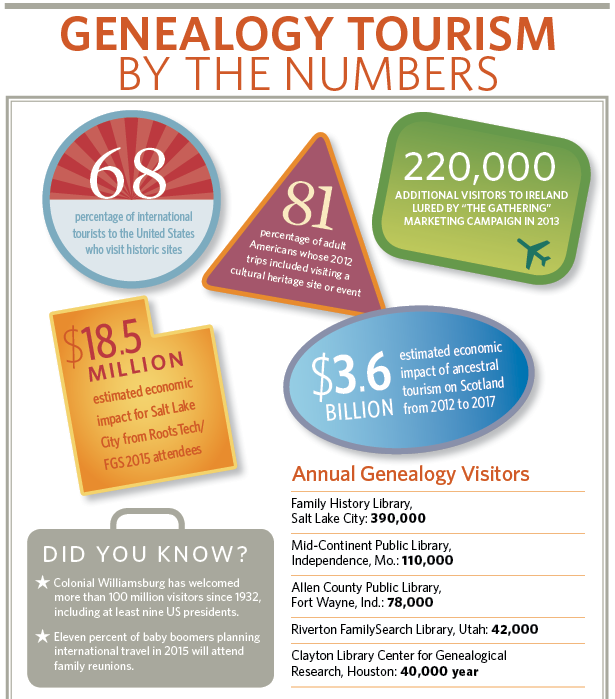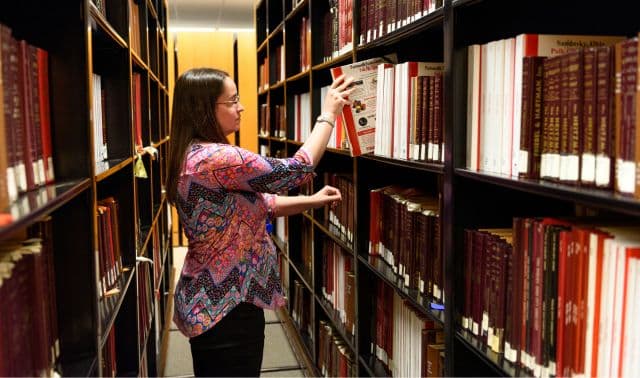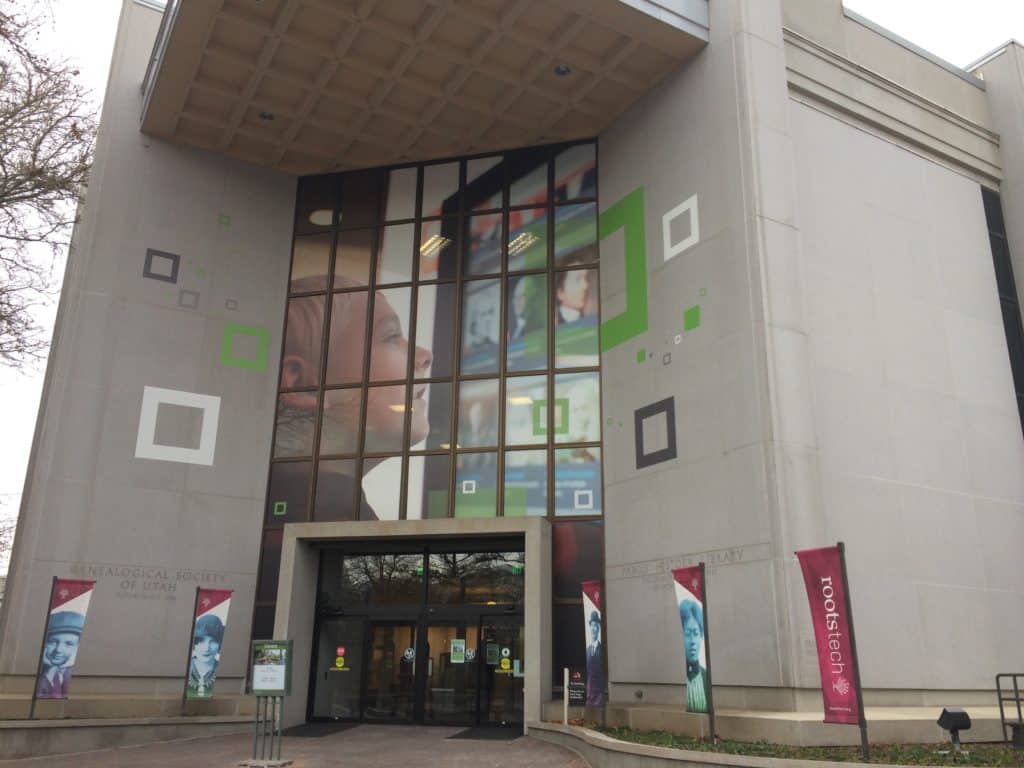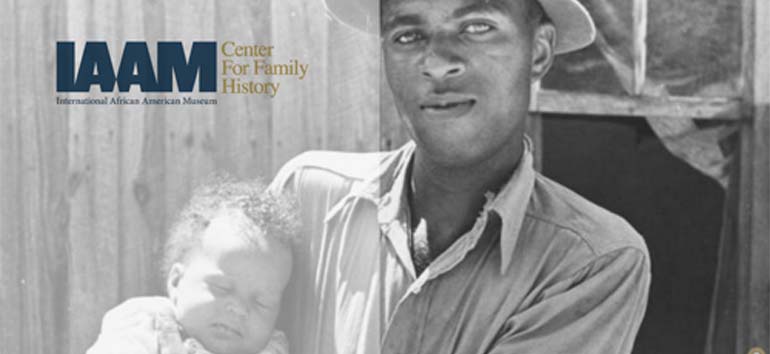A few years ago, University of Illinois Department of Recreation, Sport and Tourism professor Carla Santos described “genealogy tourists” as a fast-growing segment of leisure travelers. They aren’t looking for a relaxing getaway, she said, at least not in the traditional beaches-and-shopping sort of way. Instead, they’re tourists in search of their own stories.
After interviewing visitors to the Genealogy Center at the Allen County Public Library in Fort Wayne, Ind., Santos described them as searching for a “generational sense of the self.”
“It starts at home, where they learn everything they can online,” she says. “Then they want the tactile experience of research, of going to the library to learn more. The next step is to experience places the family comes from and get a sense of what their lives may have been like. They may even travel to that homeland.”
Two of the top US genealogy research destinations, the Genealogy Center and the Family History Library (FHL) in Salt Lake City, count a half million annual visitors between them. Host communities welcome these guests with services: In Fort Wayne, where the indirect economic impact of genealogy is an estimated $6.3 million a year, donors and taxpayers support the Genealogy Center. In Independence, Mo., the Midwest Genealogy Center partners with the local tourism bureau to market to researchers and entertain their nongenealogist travel partners.
Genealogy destinations also inspire businesses such as Ann-Mar Genealogy Trips and Ancestor Seekers, which offer research guidance and trip planning. Experts publish guidebooks such as the free e-books The Chart Chick Insider’s Guide to Salt Lake City by Janet Hovorka and Finding Ancestors in Fort Wayne by Harold Henderson.
Genealogy conferences let family historians couple on-site research with education and networking. The FHL helped draw 20,000 registered attendees to the Federation for Genealogical Societies Alaskan cruise, which includes research classes at sea. EOGN’s website features a calendar of genealogy events like these, including state and regional options.
Family historians are also among millions of Americans each year who visit historical and cultural sites such as Colonial Williamsburg and Plimoth Plantation to identify with the past.
Attractions that tell the stories of particular ethnic or cultural groups may also have archival collections for visitors researching the group. For example, the Cherokee Heritage Center in Tahlequah, Okla., also houses the Cherokee Family Research Center, and Elk Horn, Iowa’s, Museum of Danish America has a genealogy center with research materials and translation services.
And thousands of folks each year—not just avid genealogists—jet off to ancestral homelands. Countries like Ireland—where an estimated 80 million people worldwide have roots—market themselves to those with ethnic connections there. Northern Ireland counts up to 20,000 annual visitors from overseas who participate in genealogical activities during their trips.
As a scholar of tourism trends, Dr. Santos sees ancestral homeland visits as the ultimate form of genealogy travel. “When people experience different things and places, they come back transformed,” she says. “Genealogy is so personal that I imagine the transformative power of a trip like this is really great. Exploring, redefining and confirming our identities are life-long projects. This kind of genealogical travel gives us a practical way to think about belonging, home, heritage and identity.” Online “armchair” genealogy doesn’t substitute for this type of experience—it enables and facilitates it.
5 Questions With Dick Doherty
The owner-director of Celtic Quest <www.celticquest.net>, a genealogy tourism service that provides guided research trips to Ireland, has been to the Emerald Isle 34 times. Here’s what drives him.
1. How do you describe your relationship with Ireland?
I’m an American of Irish descent. I’ve always felt at home in Ireland—even on my first visit there.
I’m an American of Irish descent. I’ve always felt at home in Ireland—even on my first visit there.
2. How can someone with Irish roots get the best flavor of their homeland in one visit?
In my opinion, the best way is to travel along the Atlantic coast, visiting the small villages, enjoying an evening meal in a pub offering live Irish music, and spending the night in a bed and breakfast [and] talking with the proprietors.
In my opinion, the best way is to travel along the Atlantic coast, visiting the small villages, enjoying an evening meal in a pub offering live Irish music, and spending the night in a bed and breakfast [and] talking with the proprietors.
3. What’s the welcome like in Ireland?
If you’re coming from America, they love you. On my early trips to find distant relatives, I thought it was strange that when people let me in their homes, they’d say “you’re welcome” without me saying “thank you” first. Then I realized they were saying I was truly welcome as I entered their homes.
If you’re coming from America, they love you. On my early trips to find distant relatives, I thought it was strange that when people let me in their homes, they’d say “you’re welcome” without me saying “thank you” first. Then I realized they were saying I was truly welcome as I entered their homes.
4. What do you enjoy about watching other Irish-Americans experience Ireland for the first time?
The sheer joy and elation at being in Ireland. Also, their feeling of comfort at having guided research help. I had a person last year who was struggling because she couldn’t read the parish register she’d found. When I helped her, she realized she qualifies for Irish citizenship. She was in her 60s, I’d guess, and she was jumping up and down with happiness.
The sheer joy and elation at being in Ireland. Also, their feeling of comfort at having guided research help. I had a person last year who was struggling because she couldn’t read the parish register she’d found. When I helped her, she realized she qualifies for Irish citizenship. She was in her 60s, I’d guess, and she was jumping up and down with happiness.
5. What’s a great Irish genealogy resource that’s generally found only in Ireland?
The original Valuation Office revision books, with each of the changes and the corresponding dates recorded in various colors. The Family History Library microfilms were scanned in black and white, and don’t show the colors. Four Irish counties [have been digitized in color and] are available via the computers in the Valuation Office.
The original Valuation Office revision books, with each of the changes and the corresponding dates recorded in various colors. The Family History Library microfilms were scanned in black and white, and don’t show the colors. Four Irish counties [have been digitized in color and] are available via the computers in the Valuation Office.
Read more of our interview with Dick Doherty on the Genealogy Insider blog.

From the July/August 2015 Family Tree Magazine




